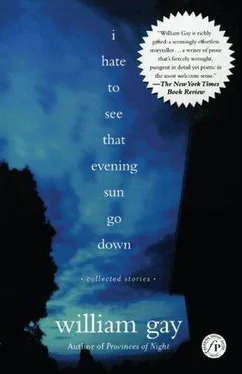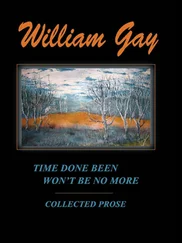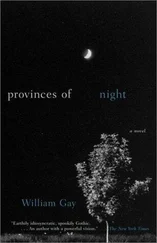She folded Stephen into her arms so hard he cried out arid tried to twist away. He couldn’t, she was holding him so tightly. She thrust her face against the hollow of his throat. She could smell him, feel his hair, the poreless texture of his skin.
I’m getting your goddamned soap, she cried against the coarse fabric of Stephen’s sweater. I’m looking for it, I’m looking for it, Fm looking for it .
J ENNY’S MOTHER once shot her husband in the thigh with a small-caliber pistol. She had been aiming higher but she was angry and the target was in desperate motion so she missed. She told it about the town with a kind of grim humor. If it had been anything like normal size I would have brought it down with one shot, she said. Who could hit a teensy old thing like that?
Tidewater heard this story or its myriad variations in disparate places. In the barbershop, in the county courthouse waiting in line to renew his license plates, in a Mexican restaurant on South Maple. He even heard a truncated version from Jenny herself. Mama tried to shoot Daddy in his thing but she got him in the leg, she said, laying the phrase out for their inspection as emotionlessly as a dealer turning up a card and awaiting betting or folding. Tidewater did not know which to believe but there was an irrevocability about the remark that seemed to call for one or the other.
Tidewater had studied her face. Jenny was a child then and her face had not yet assumed the impassivity of still waters that masked it in adolescence but still he could not read it. What response did she expect from the remark? Humor, honor, compassion? Tidewater was touched in varying degrees by all these things but he wanted to know her intent. Beneath the dark fringe of lashes her violet eyes told him nothing. Her pale heart-shaped face held only the promise of beauty and its customary vulnerability. It said what it always said: Well, here it is. Help me or hurt me, it’s all the same to me.
Jenny in those early years lived an ambivalent existence. She was part of the time with Tidewater and his wife Claire and his daughter Lisa and part of the time with her mother and whatever live-in boyfriend she was involved with at the time. Jenny’s father had wisely moved on in search of an environment where his drunken abuse would be dealt with more tolerantly. She seemed to move effortlessly from chaos to the order that Tidewater insisted upon, that in fact he had created by an act of sheer will.
Once there was a showdown of sorts in Tidewater’s front yard. Tidewater and his wife and daughter aligned on the porch with Jenny, the mother and her boyfriend standing on the brick sidewalk before the porch.
Are you Jenny’s father? Tidewater asked.
Hell no, the man said. He wore Ray-Ban sunglasses and Tidewater couldn’t see his eyes.
What is it to you?
The woman stood before the doorstep looking up at them. Like some show she was watching from the first row.
If you think you can come between me and my daughter, the woman began, listing slightly to the northeast as if she stood in the force of a strong southwesterly wind that nobody else felt, if you think you can just step in and take my child away from me then you’re living in a goddamned dream world.
Nobody’s trying to take anybody, Tidewater said. She’s Lisa’s friend and she likes staying over here. Nobody tries to persuade her one way or the other, but I’m not about to refuse to let her stay. She does what she wants to.
Well right now she’s doing what I want her to, the woman said. She’s going home. Come on, Jenny.
Jenny glanced at Tidewater then started toward the steps.
Tidewater said: Wait a minute.
The man in the yard laughed and spun his cigarette away. He wore a white shirt with the cuffs folded two careful turns over his forearms. His forearms were thick and the right bore a tattoo of the Marine Corps insignia. The tattoo was blurred as if the ink had run in the rain or as if the man was drawing sustenance from it, using it up, assimilating it into his bloodstream.
She’s not getting in that car with you, Tidewater said.
Charles, Tidewater’s wife said. She had never particularly cared for Jenny, as if she sensed something about her that Tidewater did not. I think you may be getting in over your head here.
I’ll drive her home myself, Tidewater said. You two go ahead. I’ll follow you.
I’d like to know why she’s not going to get in my car, the mother said.
Because you’re drunk, Tidewater told her.
On the way to the Harrikin the car Tidewater followed drifted across the centerline, whipped back, slipped onto the shoulder with gravel singing off the fenders. Tidewater gave them plenty of room. The car sometimes drifted into the path of oncoming traffic as if it were driverless, controlled by some deathwish volition of its own.
I don’t know if they’re going to make it or not, Tidewater said.
Jenny sat small and shrunken against the passenger-side door of the van. Her face was turned toward the sliding autumn scenery and he could see only the dark straight fall of her hair.
If they don’t I guess we could always go back to your house, she said.
TIDEWATER SAT in a hard-backed wooden chair across a littered desk from a soft-looking woman with hair the color of flax.
It’s an unpleasant situation, the woman said.
It’s a dangerous situation. She could be killed in a drunken car wreck. She could be abused sexually by a boyfriend. They could burn the house down over their heads while they sleep.
The woman shuffled the papers. Applications for help, field reports, evaluations. As if after false starts and side roads and dead ends lives had come down to this, all the identity there was contained in these neatly typed government reports.
I’m not sure precisely what you expect us to do.
I’m just reporting it. I don’t expect you to do anything. I’ve never done this before, interfered in people’s lives. I have a daughter of my own.
What he wanted done was something to eliminate the inequity in people’s lives. A balancing out of things. Jenny’s life did not seem fair. It seemed to bear little relation to Lisa’s life or the lives of other young girls who came and went in Tidewater’s house. Their lives seemed controlled, assured, as if they possessed some sort of celestial insurance policy. Jenny’s life seemed random, open-ended, unstable as quicksilver.
The flaxen-haired woman had no control over the inequity of lives. Tidewater was sorry that he had come, that he had even interfered. People’s lives went the way they went. They conformed to some law no physicist had yet devised a formula to explain.
The woman took up a form and a pen. Do you know of a specific incident of abuse? she asked.
Her life is an incident of abuse, Tidewater said.
THE LIFE THAT JENNY aspired to had been created solely by Tidewater. It was order pressed on chaos. Tidewater had fallen out of love with the world. The world no longer wanted to do his bidding. The world was going to hell in a handbasket and Tidewater wanted no part of it.
He was sick of violence. He was sick of wars, and politicians’ rationalizations for wars, of politicians themselves. Beyond Tidewater’s fences the world was falling apart. Chaos swirled like the smoke off a battlefield. Bloody insurrection stirred in the rubble of great industrial cities. In the mountains of Montana grim-faced men caressed their hoarded weapons and waited for Armageddon the way a teenager awaits a phone call. Strangers crossed in the night and gave each other AIDS as casually as handshakes. Mothers basted their children in ovens and burned them with cigarettes because there was nothing good to watch on television, drove them into deep cold waters with their safety belts thoughtfully secured.
Читать дальше












